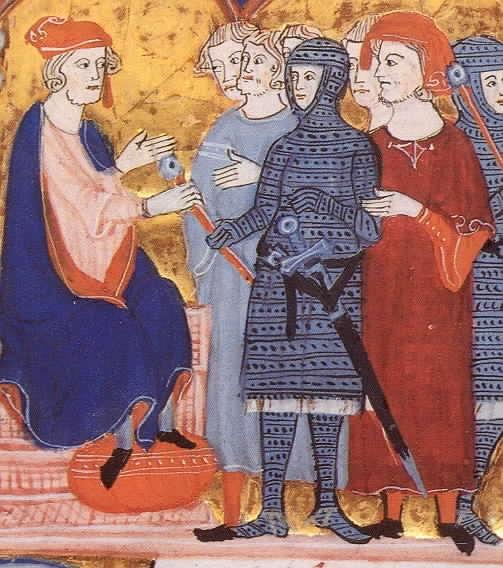
Try Amazon Fresh
Llibre dels Usastges
I-Constitucions de Catalunya
2nd quarter of the 14th Century



Book of Customs
Constitution of Catalonia
Archivo Municipal de la Paeria
Source: Jessamyn's Closet
After the conquest of the city of Valencia, on October 9, 1238 by King Don Jaime I, the leading his army composed mainly of Catalans, Aragonese, Provencals and Navarrese, the inhabitants of the City, "the evacuated mass abandoned their properties that the victors repopulated."
Despite this statement many Saracens and Jews stayed and were respected at all times, keeping their property and the freedom to continue practicing their religion. A situation that continued and lasted until the time of the Catholic Kings, when religious intolerance begins by the Church and desires of absolute power by the monarchy.
The legislative power at first was used by the Conqueror King, but before long seeing that the new Christian Kingdom needed special laws, had a meeting of personages which was attended by Peter Albalat, Archbishop of Tarragona: Berenguer Palou, Bishop of Barcelona; Vidal de Canelles, Bishop of Huesca, who served as Secretary; Bernardo Monteagudo, Bishop of Zaragoza; Pontius de Torrellas, Bishop of Tortosa; García Frontín, Bishop of Tarazona; Bernardo Calvo, Bishop of Vic, as members of ecclesiastical arm.
The arm of the nobility was represented by Ramón Folch (Viscount of Cardona), Pere de Moncada, Guillem de Moncada, Ramón Berenguer, Pedro Fernán de Albarracin, Ramón Peralta, Pere Cornel Garcia Romeu, Ximen de Urrea, Artal de Luna and Ximén Peris.
On the royal arm, folk or city dwellers, were men of the City of Valencia: Ramón Pérez de Leyda, Ramón Ramón, Pere Sanz, Guillem de Belloch, Bernat Gisbert, Tomás Gandell, Pere Balaguer, Marimón de Plegamans, Ramón Durfort, Guillem de Lazora, Bernat Zaplana, Pere Martell, Guillem Bou, Esteve de Gafería, Hug Martí, Ramón Muñoz, Ferran Periz, Andreu de Liña.
These men were the ones with the Conqueror King, corrected and set about the draft composed by Pere Albert.
These laws were copied in the draft by the Catalan canon, literally or in spirit of the "Codex" Justinian, the "Digest", the "Liber Judicum" the "Llibre dels Usages" Barcelona and "Customs" of Lleida plus some "Customs" and laws of the Arabs.
Source: TRADUCCIÓN AL CASTELLANO DE “BREUS NOTÍCIES DOBRE ELS ANTINCS FURS VALENCIANS”.